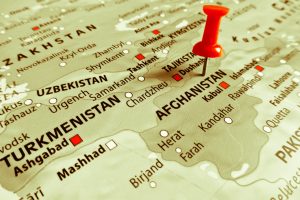Last month, not long before the cruel Afghan winter months began to set in, Afghanistan was hit by the deadliest series of earthquakes in years, claiming the lives of over 2,000 people and adding another burden on a country where a staggering 85 percent of the population lives in poverty. The European Union and United Nations jumped in quickly to promise humanitarian aid for the victims of the earthquakes, but the country is in dire need of longer-term help.
Despite the international community’s interest in Afghanistan’s stability, humanitarian assistance to the country is dwindling. Stringent sanctions only compound the humanitarian crisis faced by the Afghan people, who desperately need help.
Most Western governments, thousands of kilometers away from Afghanistan, have chosen to postpone the critical question of how to fully engage with the Taliban. Neighboring countries, however, do not have the luxury of distance. Uzbekistan, Turkmenistan, Tajikistan, Kyrgyzstan, and Kazakhstan are directly affected by the course of events in Afghanistan and have established their own bilateral relations based on that reality.
Both Western and neighboring countries have an interest in engaging with the de facto government in Afghanistan to prevent spillovers of violence, to contain cross-border terrorism, to diminish the illegal trade of drugs, and to try to address the issue of fundamental rights, in particular women’s rights. But the West is making the latter issue a precondition for dialogue – as if the Taliban will somehow be persuaded to change their regrettable policies just because European capitals send megaphonic structures to them.
The neighboring countries are taking a more pragmatic route – one that is far more likely to yield results.
Confronted with an isolated neighbor grappling with a humanitarian crisis, some countries in Central Asia, starting with Uzbekistan, have concluded that viewing Afghanistan solely through the lens of threat does not serve their interest. Instead, they view Afghan stability as being of vital importance to their longer-term development strategies. They are taking calculated risks in creating regional incentives for peace, on the grounds that economic interdependency should lead to stability. This, they hope, will provide an opportunity for linkages between Central and South Asia as well as help Afghanistan reimagine a different future, one far more aligned with being a responsible member of the international community and abiding by international norms.
Being one of the few double land-locked countries in the world, Uzbekistan has shown determination in its positioning in this regard. Just recently, Afghan and Uzbek ministers agreed on an export-import deal worth $1.2 billion. Although the Central Asian states are not fully aligned on Afghanistan, Uzbekistan could lead by example and create tangible initiatives in order to prove the benefits of regional integration and collaboration to others. One novel approach being tried is the regular C5+1 format meetings, which include the five Central Asian states plus an additional partner such as China, the Gulf States, the United States, the EU, and Germany.
Progress is being made on many topics, but three decades of insufficient dialogue among countries have left behind lingering issues such as unresolved border disputes, competing economic priorities, dependencies on larger powers, trans-border water concerns, and emerging repercussions of climate change. However, all these challenges can serve as opportunities for more profound dialogue, but only if all nations maintain their commitment to addressing these issues.
The Uzbek approach toward Afghanistan seems to be yielding results. The Friendship Bridge in Termez, which witnessed the exit of the last Soviet soldier in 1989 (one of the emblematic moment of that year, along with the fall of the Berlin Wall, to mark the imminent end of the Cold War), now serves as a vital conduit for humanitarian aid and is one of Afghanistan’s most critical transport corridors. Expanding on the success of the nearby cargo center used by several international organizations, Uzbekistan is establishing the Termez Free Economic Zone and International Trade Center, which are expected to boost trade relations. Additionally, Uzbekistan is planning a railway project connecting the country with Pakistan via Afghanistan, as well as expanding the already existing electricity transmission network inside Afghanistan.
These attempts are substantial, but the region alone cannot single-handedly transform a country that has endured nearly a century of conflict. Supporting these initiatives could represent a pragmatic approach, through which the West can discover a new role in engaging with the evolving situation in Afghanistan.

































